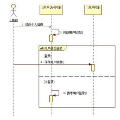The problem of fairly allocating a set of indivisible items is a well-known challenge in the field of (computational) social choice. In this scenario, there is a fundamental incompatibility between notions of fairness (such as envy-freeness and proportionality) and economic efficiency (such as Pareto-optimality). However, in the real world, items are not always allocated once and for all, but often repeatedly. For example, the items may be recurring chores to distribute in a household. Motivated by this, we initiate the study of the repeated fair division of indivisible goods and chores and propose a formal model for this scenario. In this paper, we show that, if the number of repetitions is a multiple of the number of agents, we can always find (i) a sequence of allocations that is envy-free and complete (in polynomial time), and (ii) a sequence of allocations that is proportional and Pareto-optimal (in exponential time). On the other hand, we show that irrespective of the number of repetitions, an envy-free and Pareto-optimal sequence of allocations may not exist. For the case of two agents, we show that if the number of repetitions is even, it is always possible to find a sequence of allocations that is overall envy-free and Pareto-optimal. We then prove even stronger fairness guarantees, showing that every allocation in such a sequence satisfies some relaxation of envy-freeness.
翻译:在计算社交选择领域中,公平分配一组不可分物品是一个众所周知的挑战。在这种情况下,公平(如不嫉妒和比例)与经济效率(如帕累托效率)之间存在根本性的不兼容性。然而,在现实世界中,物品并不总是一次性分配完毕,而经常是重复分配。例如,这些物品可能是家庭分配的重复杂事。出于这个原因,我们开始研究不可分商品和杂事的重复公平分配,并提出了一个形式化模型来描述这种场景。本文证明,如果重复次数是代理人数的倍数,则我们可以总是找到(i)一个使嫉妒完全消除且完成的分配序列(在多项式时间内)和(ii)一个比例和帕累托优化的分配序列(在指数时间内)。 另一方面,本文表明,无论重复次数如何,嫉妒完全消除和帕累托优化的分配序列可能不存在。对于两个代理人的情况,我们证明,如果重复次数是偶数,则总是可以找到一个序列的分配是总体上消除嫉妒和帕累托最优的。然后,我们证明了更强的公平保证,表明此类序列中的每个分配都满足某种嫉妒宽松限制。


